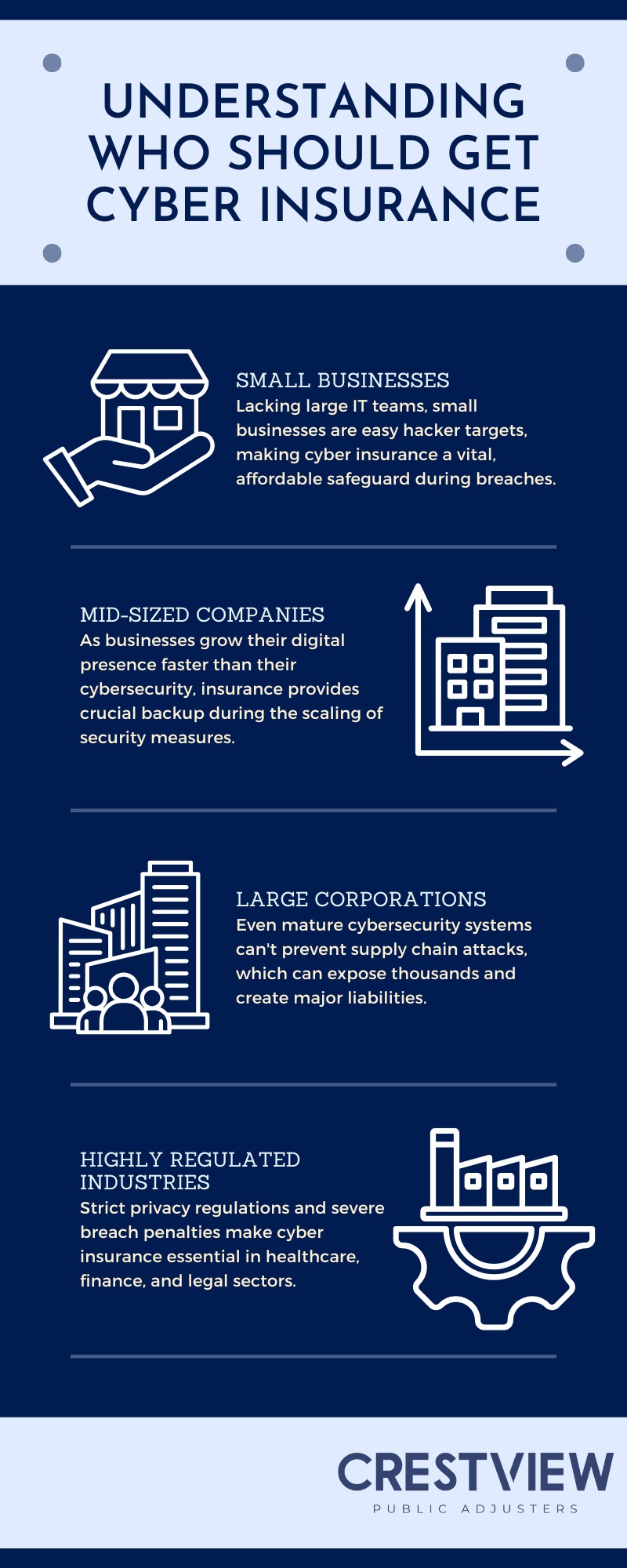Key Points:
- Cyber insurance helps businesses recover from cyberattacks, breaches, and other digital threats.
- Companies of all sizes—from startups to enterprises—face cybersecurity risks and require tailored protection.
- Filing cyber insurance claims can be complex; working with experienced public adjusters can maximize recoveries.
Cyber insurance for companies of all sizes protects businesses against financial losses caused by cyber incidents such as data breaches, ransomware attacks, and system hacks. Whether a company is a two-person startup or a global corporation, the financial fallout from cyber threats can be devastating. Cyber insurance policies help cover costs related to legal fees, forensic investigations, regulatory fines, and customer notification expenses.
The cyber threat landscape constantly evolves, and no business is immune. According to IBM’s Cost of a Data Breach Report, the global average cost of a data breach reached $4.45 million in 2023, emphasizing the critical need for robust cyber risk management strategies—insurance included.
Why Is Cyber Insurance Important for Every Company?
No business operates without data anymore. From customer information to financial records, companies house sensitive material that cybercriminals target daily. Regardless of size or industry, cyberattacks don’t discriminate.
Startups often think they’re too small to be targeted, but in reality, small businesses are 43% of cyberattack victims, according to Verizon’s Data Breach Investigations Report. Meanwhile, large organizations face sophisticated attacks intended to exploit vast networks.
The costs from a cyber event aren’t limited to immediate recovery, either. Long-term damages, including loss of reputation, customer trust erosion, and regulatory scrutiny, can cripple a company. Cyber insurance for companies ensures financial resilience, enabling businesses to recover more quickly and maintain operations.
What Does Cyber Insurance Cover?
Cyber insurance coverage varies, but comprehensive policies typically include several core protections. To better understand the breadth of coverage available, here’s a breakdown of what’s usually included:
First-Party Coverage:
- Data breach response: Covers notification costs, credit monitoring services for affected individuals, and public relations efforts.
- Cyber extortion and ransomware: Reimburses ransom payments and recovery efforts from ransomware attacks.
- Business interruption: Compensates for lost income and operational expenses resulting from a cyber incident.
- Digital asset restoration: Pays for the recovery or replacement of lost or corrupted data.
Third-Party Coverage:
- Legal fees: Covers defense costs if customers or partners sue the business after a breach.
- Regulatory fines: Pays penalties arising from violations of privacy laws like GDPR or HIPAA.
- Network security liability: Protects against claims related to failures in network security causing data loss or service interruptions.
Purchasing cyber insurance for companies requires a clear understanding of both types of coverage. Many policies allow businesses to tailor protection based on industry-specific risks, making the policy as comprehensive or targeted as needed.
Who Needs Cyber Insurance?
If your company uses computers, email, stores customer information, or processes payments online—you need cyber insurance. There’s no exception based on size or sector. Here’s why businesses across the board should consider it:

In essence, cyber insurance for companies bridges the gap between cybersecurity investments and unforeseen cyber disasters.
How to Choose the Right Cyber Insurance Policy
Choosing the right cyber insurance policy isn’t just about price—it’s about matching protection to your company’s unique risk profile. Here’s how businesses can make the best choice:
Before diving into insurance quotes, conduct a cybersecurity risk assessment. Understand what types of data you store, the systems you rely on, and your current cybersecurity posture. This analysis can guide coverage decisions.
Comparing policies, focus on:
- Coverage Limits: Make sure coverage amounts reflect potential exposure. A $500,000 limit may not suffice for a breach impacting tens of thousands of customers.
- Exclusions: Watch for common policy exclusions like prior known incidents, insider threats, or certain types of malware attacks.
- Response Services: Look for policies offering access to breach coaches, forensic experts, and PR firms to help manage fallout.
- Claims Process: Some insurers have smoother, faster claims handling than others. Investigate this during the decision-making process.
- Customization Options: Choose insurers that let you add endorsements (like coverage for social engineering fraud) based on your specific industry needs.
Consulting an expert, such as a cyber insurance claims adjuster, can help companies avoid underinsured risks and hidden gaps.
What Factors Affect the Cost of Cyber Insurance?
Cyber insurance premiums vary widely because several factors influence the cost. Insurers generally consider the company’s size and revenue, with larger companies facing higher premiums due to greater potential losses. Industry type also plays a role—sectors like healthcare, finance, and tech often see steeper rates because they are frequent targets for cyberattacks. The sensitivity of the data a company stores is another major factor; organizations handling information like credit card numbers or health records typically face higher premiums. Additionally, companies with strong cybersecurity measures, such as multifactor authentication, employee training, and incident response plans, may qualify for discounts. A company’s claims history also impacts costs, as those with previous breaches or claims often pay more.
While it can be tempting to shop for the lowest premiums, it’s important to view cyber insurance as an investment in business continuity. Choosing insufficient coverage may save money in the short term but could leave your company dangerously exposed when a serious incident occurs. Prioritizing comprehensive coverage ensures that your business remains protected when it matters most.
How to Maximize Your Cyber Insurance Coverage
Simply buying cyber insurance isn’t enough. To truly benefit, businesses must proactively align their cybersecurity practices with policy terms.
Here are strategies to maximize your coverage:
- Regularly update security policies and training programs.
- Keep software patched and up to date.
- Encrypt sensitive data at rest and in transit.
- Deploy robust access controls, like multifactor authentication.
- Conduct annual cyber risk assessments and share updates with your insurer.
Following these steps not only reduces the risk of incidents but also shows insurers you take cyber risk seriously—which can lead to better rates and fewer claim disputes.
Common Mistakes to Avoid When Buying Cyber Insurance
Even with growing awareness, many companies still make costly mistakes when securing cyber insurance coverage. A common error is assuming that general liability insurance covers cyber risks—it doesn’t. Others choose policies based solely on price, only to discover that you often get what you pay for. Many also underestimate the true scope of a potential breach, not realizing that recovery frequently costs more than expected. Overlooking policy exclusions is another serious misstep; reading the fine print carefully is crucial to avoid unpleasant surprises.
Additionally, failing to update your insurer about changes to your IT infrastructure can leave new risks uncovered, potentially exposing your business to vulnerabilities. Cyber threats evolve quickly, and your coverage must keep pace. Avoiding these pitfalls helps ensure that your cyber insurance actually works when you need it most, offering real protection and peace of mind.

Why Public Adjusters Matter for Cyber Insurance Claims
Filing a cyber insurance claim isn’t straightforward. Policyholders often face delays, disputes, and undervalued settlements. Public adjusters—independent experts who advocate for the insured—can be invaluable.
Public adjusters specializing in cyber insurance claims help by:
- Interpreting complex policy language.
- Documenting the full extent of damages and losses.
- Negotiating with insurers for fair settlements.
- Reducing the administrative burden on the company.
Especially after major incidents, partnering with a knowledgeable public adjuster can mean the difference between financial recovery and prolonged disruption.
Get the Compensation You Deserve – Work With Crestview Public Adjusters
Cyberattacks can make filing a claim just as stressful as the breach itself. Crestview Public Adjusters helps businesses in New York, Florida, and New Jersey navigate the cyber insurance claims process with confidence.Our experienced team specializes in cyber insurance claims and works solely for policyholders—not insurance companies—to secure the maximum payout you deserve. If your company has suffered a cyberattack, don’t face the claims process alone. Contact Crestview Public Adjusters today and protect your financial future.

